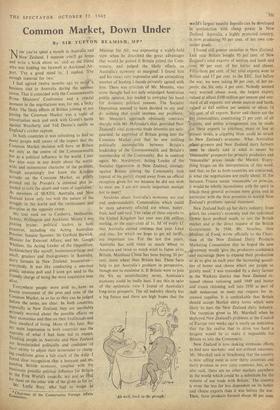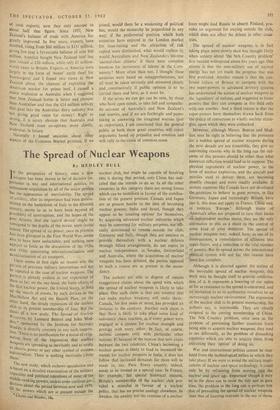Common Market, Down Under
TUFTON BEAMISH, MP* By SIR
Now you've spent a month in Australia and New Zealand, I suppose you'll go home
and write a book about us,' said an old friend who was bidding me farewell at Auckland Air- port. 'I've a good mind to,' I replied. I've enough material for two.'
1 had agreed twelve months ago to mat, a business visit to Australia during the summer recess. That it coincided with the Commonwealth Prime Ministers' Conference and a crucial moment in the negotiations was, for me, a lucky fluke. The likely effects of Britain joining or not Ic)ining the Common Market was a topic of conversation neck and neck with Gretel's battle against Weatherly and Ted Dexter's merits as England's cricket captain.
In both countries it was refreshing to find so many people well aware of the impact that the Common Market decision will have on Britain not only as the centre of the Commonwealth but as a political influence in the world. I met few who were in any doubt about the world- wide and momentous character of the problem, though surprisingly few knew the Kremlin attitude on the Common Market, so pithily Pointed out by Pravda's `a criminal plot in- tended to cure the ulcers and vices of capitalism.' As members of SEATO, Australia and New Zealand know only too well the nature of the struggle in the world and the ruthlessness and discipline in the opposite camp.
My tour took me to Canberra, Melbmirne, Sydney, Wellington and Auckland. Mostly I was Picking brains: political leaders in both Countries, including the Acting Australian Premier, Senator Spooner; Sir Garfield Barwick, Minister for External Affairs; and Mr. Gough Whitlarn, the Acting Leader of the Opposition; backbenchers like myself; businessmen' large and small; graziers and fruit-growers in Australia; dairy farmers in New Zealand; housewives— everybody. It was like conducting a one-man Public opinion poll and I soon got used to the
friendly charge of being the most inquisitive man alive.
Everywhere people were avid to have an honest assessment of the pros and cons of the Common Market, in so far as they can be judged before the terms are clear. In both countries, especially in New Zealand, they are inevitably seriously worried about the possible effects on their economies and thus on their livelihoods and their standard of living. More of this later. But my main impression in both countries was the
Thinking of what I had been led to expect. Thinking people in Australia and New Zealand their broadminded politically and confident of Meir ability to adjust their economies to chang- ing conditions given a fair crack of the wnip. I found clear recognition that a buoyant and ex- Panding British economy, coupled with the Maximum possible political influence for Britain In the Free World's councils, are just as vital for r them on the other side of the globe as for us. Mr. Leslie Bury, who had to resign as co Chairman of the Conservative Foreign Affairs rnmittee. Minister for Air, was expressing a widely-held view when he described the great advantages that would be gained if Britain joined the Com- munity, and judged the likely effects on Australia's economy as marginal. I found him and his views very impressive and an astonishing number of leading Liberals privately agreed with him. There was criticism of Mr. Menzies, who some thought had not only misjudged Australian public opinion, but tended to overplay his hand for domestic political reasons. The Socialist Opposition seemed to have decided to say and do nothing that could increase our problems. Mr. Menzies's approach obviously contrasts sharply with Mr. Holyoake's that, provided New Zealand's vital economic trade interests are safe- guarded, he approved of Britain going into the Common Market and that he saw nothing politically incompatible between Britain's leadership of the Commonwealth and Britain's membership of the Community. But in contrast' again, Mr. Nordmeyer, Acting Leader of the Socialist Opposition in New Zealand, strongly against Britain joining the Community (not typical of his party), stayed away from an official reception given for me because he did not wish to meet me. I am not nearly important enough not to meet!
Anxieties about Australia's economy are real and understandable. Commodities which could he most adversely affected are wheat, butter, fruit, beef and veal. The value of these exports to the United Kingdom last year was £46 million sterling, or the equivalent of Is. 3d. of every that Australia earned overseas that year. Lead and zinc, for which we hope to get nil tariffs, are important too. For the last few years, Australia has sold twice as much wheat to America and twice as much wool to Japan as to Britain. Mainland China has been buying 50 per cent. more wheat than Britain has. These facts help to put Australia's problem in perspective, though not to minimise it. If Britain were to join the Six on unsatisfactory terms, Australia's economy could be badly hurt. I say this in spite of the optimistic view I found of Australia's long-term prospects. The oil industry clearly has a big future and there are high hopes that the
`Ah well. back to the plough.' world's largest bauxite deposits can be developed in conjunction with cheap power in New Zealand. Australia, a highly protected country, is now producing 90 per cent. of her own con- sumer goods.
I found still greater anxieties in New Zealand. Last year Britain bought 95 per cent. of New Zealand's total exports of mutton and lamb and over 90 per cent. of her butter and cheese. Fifty-three per cent. of her total exports went to Britain and 17 per cent. to the EEC. Just before the war, we were taking 80 per cent. of her ex- ports; the Six only 4 per cent. Nobody seemed very worried about wool, the largest export, valued at about £100 million per annum and one- third of all exports; nor about mutton and lamb, valued at £45 million per annum or about 14 per cent, of all exports. Butter and cheese are the key commodities, constituting 21 per cent. of all exports, and unless arrangements can be made for these exports to continue, more or less at present levels, a crippling blow could be struck to New Zealand's economy, What Australian wheat-growers and New Zealand dairy farmers must be clearly told is what is meant by `reasonable' prospects for primary producers and `reasonable' prices inside the Market. Every- thing hinges on the interpretation of this word, and that, so far as both countries are concerned, is what the negotiations are really about. 'If, for instance, France meant 'reasonable' en principe, it would be wholly inconsistent with the spirit in which these general promises were given and in particular with the firm promises to accord New Zealand's problems special treatment.
New Zealand built up her dairy industry, from which the country's economy and the individual farther have profited much, to suit the British market and at the direct request of the British Government. In 1948, Mr. Strachey, then Minister of Food, wrote officially to the Chair- man of the New Zealand Dairy Products Marketing Commission that he hoped the new agreement would 'give the producers confidence and encourage them to expand their production se as to give us each year the increasing quanti- ties of butter and cheese which our people so greatly need.' I was reminded by a dairy farmer in the Waikato district that New Zealand re- tained cheese rationing until 1949 and butter and cream rationing well into 1950 as part of their endeavour to meet our request for in- creased supplies. It is unthinkable that Britain should accept Market entry terms which were likely to hurt the New Zealand dairy industry. The reception given to Mr. Marshall when he deployed New Zealand's problems at the Council of Europe two weeks ago is surely an indication that the Six realise that to drive too hard a bargain would be to make it impossible for
Britain to join the Community.
New Zealand is now making strenuous efforts to find new markets—and not without successes. Mr. Marshall said in Strasbourg that the country is now selling meat in over thirty countries and dairy produce in over sixty countries, but, as he also said, 'there are no other markets anywhere in the world which could be a substitute for the volume of our trade with Britain.' The country is none the less far less dependent on its butter and cheese exports than it was before the war. Then, these products formed about 40 per cent.. of total exports; now they only amount to about half that figure. Since 1957, New Zealand's balance of trade with America has greatly improved. In five years, exports have doubled, rising from $66 million to $131 million, giving last year a favourable balance of over $60 million. America bought New Zealand beef last Year valued at £20 million, while only £1 million- Worth came to Britain. Exports to America were largely in the form of 'boner' cattle (beef for hamburgers) and I found two views in New Zealand about the chances of exploiting the American market for prime beef. I caused a minor explosion in Australia when I suggested that New Zealand butter is better and cheaper than Australian and that the £14 million subsidy that goes into the Australian dairy industry was not giving good value for money! Right or wrong, it is surely obvious that Australia and New Zealand must co-operate more closely, tradewise, in future.
Naturally I found anxieties about other aspects of the Common Market problem. If we joined, would there be a weakening of political ties; would the monarchy be jeopardised in any way; if the preferential position which both countries have enjoyed in the London market for loan-raising and the attraction of risk capital were diminished, what would replace it; would Australians and New Zealanders become 'second-class citizens' if there were complete freedom for movement of labour in the Com- munity? More often than not, I thought these anxieties were based on misapprehensions, but all must be taken seriously and answered clearly and constructively if public opinion is to be carried there and here, as it must be.
If the terms we can get can be seen, by those who have open minds, to take full and sympathe- tic account of Australia's and New Zealand's real worries, and if we are forthright and pains- taking in answering the imagined worries (just as important), I am convinced that the general public in both these great countries will reject arguments based on prejudice and emotion and will rally to the cause of common sense.







































 Previous page
Previous page